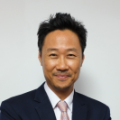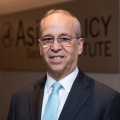This program is part of the Asia Society Policy Institute’s (ASPI) series entitled “Coronavirus, Asia, and the World.” Throughout the coming weeks, ASPI will be presenting web-only programs every Tuesday and Thursday to analyze the scope of the ramifications from the novel coronavirus across the Asia-Pacific region and the world. All events will be live-streamed on YouTube and Facebook. For information about future events in this series and for ASPI’s additional coronavirus content see here.
The rulers of the “Hermit Kingdom” have fiercely resisted foreign influence, vigorously guarded North Korea’s territory, and ruthlessly controlled its populace. They have endured sanctions, deflected international pressures, and defied the world’s strongest countries. Have they defied the Novel Coronavirus too? North Korean leader Kim Jong Un took quick action to ban foreign visitors and impose long quarantines, recognizing the risk of an epidemic. With a weak public health system, even North Korean officials acknowledged that a major outbreak would spell disaster for the country. But with a porous, 900-mile border with China replete with smugglers, have there really been zero cases of COVID-19 as official statements have claimed?
While the pandemic raged around the world in March and as U.S. and South Korean troops canceled annual exercises to prevent contagion, North Korea launched a threatening barrage of missiles and continued to warn of worse to come if the U.S. does not begin to lift sanctions — so what should we expect in the coming months? If North Korea has so far been spared a major epidemic, it has not avoided the economic effects of a near-complete shutdown of trade — so has COVID achieved the “maximum pressure” that sanctions could not?
Please join us for a discussion of the humanitarian, economic, and geopolitical impact of COVID-19 on North Korea. Asia Society Policy Institute’s Daniel Russel will explore these questions with two extraordinary experts on North Korea — Harvard Medical School scholar Dr. Kee B Park, who leads an effort to assist doctors in North Korea, and Brookings Institution Senior Fellow Dr. Jung H. Pak, the author of a book published this month: “Becoming Kim Jong Un: A Former CIA Analyst’s Insights into North Korea’s Enigmatic Young Dictator.”
SPEAKERS

Jung H. Pak is a Senior Fellow and the SK-Korea Foundation Chair in Korea Studies at Brookings Institution’s Center for East Asia Policy Studies. She is the author of “Becoming Kim Jong Un: A Former CIA Analyst’s Insights into North Korea’s Enigmatic Young Dictator” (Ballantine, April 2020). From 2014 to 2016, Pak served as a deputy national intelligence officer at the National Intelligence Council in the Office of the Director of National Intelligence (DNI). In that role, Pak led the U.S. intelligence community’s (IC) production of strategic analysis on Korean Peninsula issues, represented the IC in White House policy meetings, provided direct analytic support to the National Security Council, and advised the DNI and his senior staff on key developments and emerging issues. At CIA, where she won multiple awards for superior analytic accomplishments and service, Pak produced timely and actionable analysis for the president and also helped to manage and support CIA’s projects related to the U.S. presidential transition.

Kee B. Park, MD is a Lecturer on Global Health and Social Medicine at Harvard Medical School, and the Director of the North Korea Program at the Korean American Medical Association, where he leads the collaboration between US and DPRK physicians. Since 2007, he has made 18 visits to DPRK, most recently in May 2018. Before joining the faculty at Harvard Medical School, he worked under Prof. John G. Meara at the Program in Global Surgery and Social Change as the Paul Farmer Global Surgery Scholar. Dr. Park is a consultant for the World Health Organization and serves on the WHO Expert Advisory Panel on Surgical Care and Anesthesia. In this capacity, he advocates for and assists in the development of national surgical plans by the Member States. He is a diplomate of the American Board of Neurological Surgery, a member of the Advisory Committee for the Foundation of the World Federation of Neurosurgical Societies, a member of the National Committee on North Korea, and a member of the Council of Korean Americans.

Daniel Russel is Vice President for International Security and Diplomacy at the Asia Society Policy Institute. A career member of the Senior Foreign Service at the U.S. Department of State, he most recently served as the Assistant Secretary of State for East Asian and Pacific Affairs. He served at the White House as Special Assistant to the President and National Security Council Senior Director for Asian Affairs, where he helped formulate President Obama’s strategic rebalance to the Asia Pacific region.
